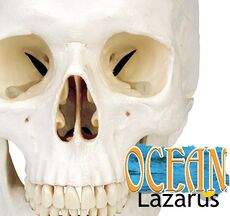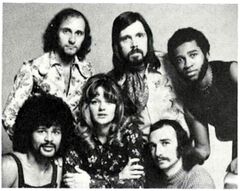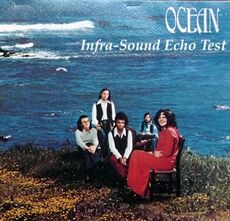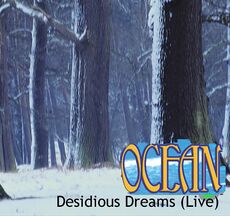Ocean (band)
Ocean are a Canadian Christian/progressive rock band comprising vocalist/keyboardist Greg Brown, bassist/vocalist/songwriter Jeff Jones, guitarist/vocalist Janice Morgan, guitarist Dave Tamblyn, and drummer virtuoso Chuck Slater. Unlike most bands of the time, Ocean's lineup has been (mostly) constant and unchanging from conception to the current day.
B.O. (Before Ocean)[edit]
Ocean was formed in the summer of 1970, in Prince Albert in a Can National Park, Saskatchewan, Canada, by hippies Greg Brown (cousin of Rush engineer Terry Brown), Janice Morgan, and Dave Tamblyn, plus lifelong songwriting partners Jeff Jones (who by coincidence had quit his one-day gig with Rush in 1968) and Chuck Slater. Having been friends since starting school, Jones and Slater had developed musically side-by-side and had a common vision of what Canadian rock should be.
Jones's talent as a songwriter was evident from as young an age as three. "His gifts were there for all to see", recalls music teacher Stan Egglington: "Every sentence Jeff said was lyrical poetry, he could rhyme anything." Jones also had a talent for guitar playing, although tragically this musical avenue was closed off to him in 1967 when he was involved in a tragic boating accident which robbed him of three of the fingers on his left hand; this would later be his inspiration when writing the band's hit single "Put Your Hand in the Hand". Unable to express himself musically, Jones became despondent and withdrawn, until Greg Brown, a new acquaintance of Chuck Slater's, met him and introduced him to the electric bass.
Jones, able to play the instrument without a full allowance of digits, instantly fell in love with the bass and began writing songs at an unprecedented rate. "Jeff wrote enough songs in that short period to keep us going from then on," recalls Slater: "We had a special shed which we used to keep all the songs in, all on paper, and whenever we wanted to do a new album we'd just send someone in with a stapler to collect 12 at random." Greg Brown spent more and more time with Jones and Slater from that point, developing with them his own inimitable style of keyboard playing. By 1970 they united in a common vision for the future, under the banner Ocean, a name under which they would all play from then on.
1970–1975[edit]
After Ocean formed the band practiced together and honed their collective musical abilities. They started playing in small local venues to small local crowds. Within the five following years they developed a modestly sized but fiercely loyal fanbase in their home-province of Saskatchewan and were eventually signed up by the now-defunct up-and-coming Canadian record company 5ft 5m Records. It was while with 5m that Ocean recorded and released their first record, Infra-Sound Echo Test (1971).
Infra-Sound Echo Test[edit]
For a first album this is very ambitious. It doesn't have the polished together feel of many of the band's later releases but it is certainly the most energetic and earnest of the band's albums. Borrowing heavily from lesser-known recording artists like Lysurge and Twistacular, the style is psychedelic rock for around two thirds of the tracks, with the remaining third being more ambient, like sticking up stars while underwater.
Noteworthy tracks include "Put Your Hand in the Hand of the Jesus Man" (the band's biggest hit single, later featured by evangelist Garner Ted Armstrong on CBS's Hee-haw), "Rainbow Connection" (featuring the first ever recorded utterance of the word "hats" on any recording medium anywhere), "Aprils" (featuring an oboe), "Purple Haze" (a Jimi Hendrix cover), "Deep Enough for Me" (later covered by the Bee Gees), and "We Got a Dream" (a Martin Luther King, Jr. cover, later covered by The Go-Gos).
“This petulant noise angers me!”
“...shut up God, you just don't understand, you're too old, far too old. Actually dad, how old are you? How come I got a birthday and hand-holders and you don't have them? Are you older than Parkinson?”
The Astral Traveller Alan Parsons Project[edit]
While signed with Artie Ripp's Kama Sutra Records, Ocean released another studio album. A little more cohesive than the first album, The Astral Traveller Alan Parsons Project (1972) is hard to find, but is considered still today, to be one of the most important albums in the psychedelic rock genre. The whole album was played as one-hour long studio session and cut into separate tracks during the edit. The band, all twisted on LSD, THC, MDMA, PCP, and GHB, were only transitorily aware that they were even holding instruments.
Notable tracks this time around were "Make the Sun Shine" (an Aquarius cover), "Give Tomorrow's Children One More Chance" (a boomer apologia screed), and "I Have a Following" (another MLK cover, later covered by Phil Collins).
“We set up a video camera in one corner prior to recording the album, watching it back afterwards we could see ourselves careening around the room screaming, either fighting with guitars or trying to fuck them, I'm not sure which. I don't remember any of it.”
1976–1978[edit]
After the relative flop of their second album, Ocean signed to EMI Records, and under them released four studio albums, two live albums, and a two-disc Greatest Hits. The period between 1976 and 1978 was characterized by a musical move into a less psychedelic and more "prog" style of rock, borrowing less and less from American funk groups like Funkamatronic and Bitch Slap Bass, and more and more from American and British prog bands like Steven Tyler's Underground Tunnel and Boldly Zenith.
Wheels of Lysergic Progress[edit]
1976's Wheels of Lysergic Progress shows a powerful push from the colourful psychedelia of old to the twisted absurdity of prog. Being an early attempt at the new style it often finds itself heading down cul-de-sacs and having to five-point turn to get out. Brave but fundamentally poor.
Noteworthy tracks are "Suck/Blow" (featuring the first of Greg Brown's misguided forays into experimental brass instrumentalism) and "Hyphen-Hyphen".
“Absolutely BANG! It's direct, it's vague, it's fresh and punchy. This album categorized a zeitgeist. Pure drummage.”
“Having signed to a "proper" label we all knew we were, essentially, the biggest thing around; bigger than Jesus (he was now in the palm of *our* hands), certainly bigger than Buddha or that elephant one. I think that bombast really comes through on Lysergic Progress. We — I especially — sound like the fucking shit.”
Desidious Dreams[edit]
Having only ever played small local venues before, the Progress tour was the band's first fully international tour, as it took them to the USA. For both Chuck Slater and Jeff Jones it was the first time they'd ever left Canada, or seen escalators. Though they were growing rapidly in popularity the band didn't yet have sufficient fans to fill the ambitiously large venues booked for them. As such many of the shows went poorly evoking tremendous acts of violence from Jeff Jones, against assorted lighting technicians.
However there were a few salvageable gigs on the tour, the best of which were preserved and pressed to vinyl, being the album which is that one of which I am talking about. Noteworthy tracks were "Babylonia Babble" (which features the extremely rare fourth verse in which Brown infers that the Jews are not the men to be blamed for nothing) and "Star-Bound Anti-Voyage (during which you can clearly hear Chuck Slater weeping during a twelve-minute keyboard solo).
“I love this early sound, it's so raw and potent, really skellington, really honest. It's a bit shit though, I mean they're not really in-tune or in-time, but the passion's there; that's key, the passion. It's like Jesus; he probably couldn't play bass for shit, almost certainly couldn't change time signatures halfway through a chorus, whilst crowd-surfing, but we let him off that hook, because of the passion...and the Machine Messiah thing.”
Flying Over the Ethersphere[edit]

Ocean, by now high in terms of popularity and drugs, made one last brief foray into outright psychedelia. This infuriated the old fans who saw it as a subpar album on the route to regression, and also the new fans who'd been drawn to the prog sound. It is interesting to note that, having been the band's poorest-selling album whilst signed to EMI at the time, it is now their highest-selling album ever. As each new generation of teenagers discover drugs and music, sales of Ethersphere rocket, and the album is now triple-platinum.
Notable tracks on this slab were "Electric Fuck" (the first song ever to be refused entry into the charts through pure confused terror), "Come in Number 6" (a tribute to the British television series The Prisoner, featuring star Patrick Mcgoohan on bassoon), "Ajax Sneeze" (a favourite of the band's but one which could never be played live due to the impracticality and cost of transporting dolphins internationally and also due to the amount of time required for the band members to detox and rehabilitate after each performance of the song).
“Ah man dis pure head-fuck, ah hit mad bong an tripledrop to dis, ruin me headspace boy, can real see the music, like rainbow snakes you wanna eat, dem flyin' at you so big, an den dem trumpets hit you an it's over......gheee.”
1979–1987[edit]
Riding high on a wave of international popularity Ocean, by the start of the '80s, seemed untouchable. Unfortunately as musical tastes changed, Ocean didn't, and before long they began to lose out to the emerging new wave of new wave and romantic new new romanticism. EMI, perceiving the decline in the band's popularity, quickly released a Greatest Hits album, as a kind of money-making bookend to the band's roller-coaster career. Tragedy would soon strike that would cause the band to go on hiatus.
The Oddity[edit]
The Oddity, released in 1980, was prog as fuck; it sounded like a blues orchestra falling down a flight of stairs in space. Each track segued into the next, the result being a 70-minute electro-rock-jazz voyage through space sickness. Perhaps the greatest prog rock album ever pressed to vinyl.
“......................what are you waiting for me to say, huh? I was asleep.”
The Odyssey[edit]
This 1981 album was recorded during the live international tour of the Oddity album, the result of which is that it is identical to The Oddity, the only notable difference being the quality of the musicianship, singing, and recording. Jeff Jones is absent from the final four tracks, having stormed out after a particularly violent binge-war, and he briefly went off to join Tom Cochrane's Red Rider before returning to Ocean.
“It's The Oddity but shittier; it's like The Oddity, but drunk and tired and recorded on a Dictaphone.”
The Stranger from Venus[edit]
The Stranger from Venus was eked out in 1983. By this point in the mid-'80s the band was beginning to fall apart. The huge combined drugged egos and paranoia of the collective members was forcing the music into bizarre directions, the result being a kind of erotic-thriller-polka-synth abortion interspersed with screamy trad-rock and meandering spoken-word pieces. This constant fighting seemed to signal the end for Ocean's run with EMI, but it didn't...appalling album sales did.
"Noteworthy" tracks include "Dreary Desiree" (a seven-minute scream layered over the sound of reversed feedback), "Check My Fuck" (a shambolic half-hour drum solo courtesy of Chuck Slater), and "Mahumodo" (Jones's surprisingly pleasing black metal venture).
“This was a bitch of a record to produce; half the time we couldn't get the band into the studio, the other half we couldn't get them out. They were smashed out of their heads throughout. Greg bit Chuck, really quite hard, Jeff started screaming that he was the new flesh, and Janice started vomiting rainbows; we weren't sure whether to call a doctor or a priest, haha. Great days.”
Ocean (Greatest Hits)[edit]
Wanting to close off the Ocean phenomenon and also make as much money as possible from the band before they became unmarketable, EMI released the band's self-titled Greatest Hits album in 1986 and then dropped them. Unfortunately due to a pressing error both discs in the set are completely blank; however the soft-headed music-buying public saw this as an hilarious in-joke and took the album triple platinum within an afternoon.
“EMI fucked us didn't they, made us into a fuckin' mockery! The Man are always fucking up everything. They'll get theirs when the revolution comes.”
In 1987, Chuck Slater unexpectedly committed suicide. A distraught Ocean disbanded, and each of the three members moved back in with their parents.
1999–present[edit]
The generation who'd lived their youth through the heyday of Ocean and the myriad other similar bands had by now become old, their memories patchy and their brains runny. As such they now had no memory of the awfulness of the music and their rose-tinted glasses and crippling middle-age made them nostalgic for the music of their pasts. Also a new generation of "music-loving" stoner proles, disenfranchised from the feeble modern boyband/nu-metal dross, looked to the past for salvation.
It is due to this sickening anomaly in the musical climate that Ocean, along with most of their peers, were able to reinvigorate their careers.
Progression[edit]
Having re-formed the band decided that, rather than coming up with any new songs they'd just re-tour their old songs and pray for the nostalgia dollar. In 1999 they played live at Madison Square Garden alongside Billy Joel, and the show was released under the title Progression. With modern amplification and recording this record is naturally of a higher standard than the previous live albums, and the band's musicianship doesn’t seem to have suffered from the long absence. However it has to be noted that on several tracks — due to the ravages of age, poor health, and hallucinogenic drugs — members of the band can be heard to forget words, confuse songs, and in some cases collapse, stroke, or actually die while on-stage. This was their first release on Kosher Records.
“WOOOOOOO! YEAHHH! OCEAN! OCEAN! OCEAN! Broonsie crowd-surfed and I got hold of his jacket and wouldn't let go! I TOUCHED Greg Brown! I'm SHAKING! Eventually the jacket came off and I have it now! It still has one of his ARMS in it, I think he has LEPROSY! Now that's GROOVY! Keep rocking guys! WOOOOO!!!”
Lazarus[edit]

After the resounding success of their live comeback tour, Ocean decided to record an album of new songs, titled Lazarus (2002). Naturally they tried to recreate their past magic, whilst adding a contemporary feel, and naturally the result was both painfully outdated and also mawkishly crass and uncool. As a mark of the record it can now be purchased for shrapnel, a mere two decades after its release.
Noteworthy tracks: N/A
“A solid return to form, proud to know them, yes, yes...yes.....SEVEN!........POP!........It's like they never went away...isn't it? Isn't it just...”
“Sorry? Mmmm yeah, where's camera?...no camera? Right where's my baby-cake? Oi! You savage cunt where is this? Where?...what? You’re recording my voice? Shit mate burn this.......I'll suck for crack you know.”
Rhombometric Nonvibrating Hipotensure[edit]
In 2007 the band released Rhombometric Nonvibrating Hipotensure, a DVD compilation of all their live shows and music up to that point. This album was marketed by Kosher as "an ideal collection for a fan, or for a non-fan who wants to stick their tongue into the salty fanblade that is Ocean."
It didn't sell.
Still Progressing[edit]
Ocean are currently rumoured to be working on Still Progressing, said to be their last studio album before they go the way of Jeff Jones's previous band. It's unlikely it will be able to top Clockwork Angels as a swan song.
| ||||||||||||||



